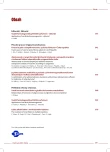-
Medical journals
- Career
Application of warfarin pharmacogenetics
Authors: A. Tomek 1,2; V. Maťoška 1; T. Kumstýřová 1; L. Táborský 1
Authors‘ workplace: Laboratoř molekulární diagnostiky Oddělení klinické biochemie, hematologie a imunologie Nemocnice Na Homolce Praha, přednosta prim. MUDr. Luděk Táborský 1; Neurologická klinika dospělých 2. lékařské fakulty UK a FN Motol Praha, přednosta doc. MUDr. Martin Bojar, CSc. 2
Published in: Vnitř Lék 2009; 55(6): 565-569
Category: Reviews
Overview
Even with its narrow therapeutic index, interindividual variability in daily dose and possible serious bleeding complications, is warfarin the mainstay of therapy and prevention of thromboembolic disease. The application of pharmacogenetics in testing individual polymorphisms of two genes CYP 2C9 (pharmacokinetics of warfarin) and VKORC1(sensitivity on warfarin) is promising tactics leading to a safe anticoagulation. The first of two applications of pharmacogenetics is assesment of the daily dose of warfarin for individual patients even before starting the therapy. The second is the risk stratification of already warfarinized patients: The carriers of variant genotype are in a greater risk of bleeding complications. The following article is dedicated to the evaluation of literature and our own laboratory and clinical experience with these applications in clinical practise.
Key words:
warfarin – pharmacogenetics – CYP 2C9 – VKORC1
Sources
1. Wadelius M, Chen LY, Eriksson N et al. Association of warfarin dose with genes involved in its action and metabolism. Hum Genet 2007; 121 : 23–34.
2. Sanderson S, Emery J, Higgins J. CYP2C9gene variants, drug dose, and bleeding risk in warfarin‑treated patients: a HuGEnet systematic review and meta‑analysis. Genet Med 2005; 7 : 97–104.
3. Buzková H, Pechandová K, Slanař O et al. Genetický polymorfismus cytochromu CYP2C9 v české populaci. Klin Biochem Metab 2007; 15 : 102–105.
4. Rieder MJ, Reiner AP, Gage BF et al. Effect of VKORC1 haplotypes on transcriptional regulation and warfarin dose. N Engl J Med 2005; 352 : 2285–2293.
5. Lindh JD, Lundgren S, Holm L et al. Several-fold increase in risk of overanticoagulation by CYP2C9 mutations. Clin Pharmacol Ther 2005; 78 : 540–550.
6. Peyvandi F, Spreafico M, Siboni SM et al. CYP2C9 genotypes and dose requirements during the induction phase of oral anticoagulant therapy. Clin Pharmacol Ther 2004; 75 : 198–203.
7. Rost S, Fregin A, Ivaskevicius V et al. Mutations in VKORC1 cause warfarin resistance and multiple coagulation factor deficiency type 2. Nature 2004; 427 : 537–541.
8. D’Andrea G, D’Ambrosio RL, Di Perna P et al. A polymorphism in the VKORC1 gene is associated with an interindividual variability in the dose‑anticoagulant effect of warfarin. Blood 2005; 105 : 645–649.
9. Schwarz UI, Ritchie MD, Bradford Y et al. Genetic determinants of response to warfarin during initial anticoagulation. N Engl J Med 2008; 358 : 999–1008.
10. Wadelius M, Chen LY, Downes K et al. Common VKORC1 and GGCX polymorphisms associated with warfarin dose. Pharmacogenomics J 2005; 5 : 262–270.
11. Carlquist JF, Horne BD, Muhlestein JB et al. Genotypes of the cytochrome p450 isoform, CYP2C9, and the vitamin K epoxide reductase complex subunit 1 conjointly determine stable wttestoarfarin dose: a prospective study. J Thromb Thrombolysis 2006; 22 : 191–197.
12. Taube J, Halsall D, Baglin T. Influence of cytochrome P-450 CYP2C9 polymorphisms on warfarin sensitivity and risk of over-anticoagulation in patients on long‑term treatment. Blood 2000; 96 : 1816–1819.
13. Anderson JL, Horne BD, Stevens SM et al. Randomized trial of genotype-guided versus standard warfarin dosing in patients initiating oral anticoagulation. Circulation 2007; 116 : 2563–2570.
14. Gage BF, Eby C, Milligan PE et al. Use of pharmacogenetics and clinical factors to predict the maintenance dose of warfarin. Thromb Haemost 2004; 91 : 87–94.
15. Gage BF, Eby C, Johnson JA et al. Use of pharmacogenetic and clinical factors to predict the therapeutic dose of warfarin. Clin Pharmacol Ther 2008; 84 : 326–331.
16. Sconce EA, Khan TI, Wynne HA et al. The impact of CYP2C9 and VKORC1 genetic polymorphism and patient characteristics upon warfarin dose requirements: proposal for a new dosing regimen. Blood 2005; 106 : 2329–2333.
17. Wadelius M, Chen LY, Eriksson N et al. Association of warfarin dose with genes involved in its action and metabolism. Hum Genet 2007; 121 : 23–34.
18. Millican EA, Lenzini PA, Milligan PE et al. Genetic‑based dosing in orthopedic patients beginning warfarin therapy. Blood 2007; 110 : 1511–1515.
19. Aithal GP, Day CP, Kesteven PJ et al. Association of polymorphisms in the cytochrome P450 CYP2C9 with warfarin dose requirement and risk of bleeding complications. Lancet 1999; 353 : 717–719.
Labels
Diabetology Endocrinology Internal medicine
Article was published inInternal Medicine

2009 Issue 6-
All articles in this issue
- Twenty years of care for cystic fibrosis adults in Czech Republic
- Alemtuzumab in chronic lymphocytic leukemia treatment: retrospective analysis of outcome according to cytogenetics
- Is confirmation of an adrenal adenoma in patients with primary aldosteronism sufficient for indication of adrenalectomy?
- Relationships of hormones of adipose tissue and ghrelin to bone metabolism
- Application of warfarin pharmacogenetics
- The treatment of renal failure in multiple myeloma
- From the diagnosis of celiac disease to the prospect of legislative changes
- The case of familial adenomatous polyposis and a proposal for the system of dispensarisation
- Localized tracheobronchial amyloidosis, type AA, and its differentiation from the systemic form of amyloidosis in clinical practice
- Venous thromboembolism in an oncology patient
- Ascites in Mulibrey syndrome
- Internal Medicine
- Journal archive
- Current issue
- Online only
- About the journal
Most read in this issue- The treatment of renal failure in multiple myeloma
- Is confirmation of an adrenal adenoma in patients with primary aldosteronism sufficient for indication of adrenalectomy?
- Application of warfarin pharmacogenetics
- The case of familial adenomatous polyposis and a proposal for the system of dispensarisation
Login#ADS_BOTTOM_SCRIPTS#Forgotten passwordEnter the email address that you registered with. We will send you instructions on how to set a new password.
- Career

